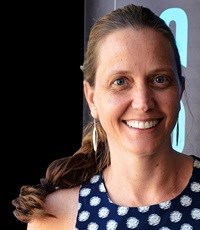#WomensMonth: Digital doyenne Natasha Fourie
Having worked as a strategist in the local advertising and media industry for close to 20 years, Fourie has had the privilege of working on some of the most remarkable brands in some of the top advertising agencies and media companies. Her work across the IAB measurement and IAB research portfolios involves improving digital industry metrics, while creating and providing deep-dive insights into various markets and bridging the gap between traditional and digital thinking.
Seismic shifts in digital consumption

As a result of this, she’s in the perfect position to point out that as an industry, we still need to work quite hard at keeping pace, ignoring fads and focussing on the seismic shifts in consumption, while also ensuring that as brands and publishers we are adapting and investing accordingly. Likewise, she says, “The measurement and data insights need to be adaptable enough to keep pace with where the market is moving to.”
As to where the market is moving, Fourie says digital has become such an all-encompassing word that it includes the digitisation of processes and structures, the consumer behaviour choices in terms of the digital platforms they choose, as well as a democratisation of access. Fourie says the way information is gathered and distributed to ensure that relevant and valuable content is delivered to the end consumer to increase engagement is another crucial aspect of digital work.
An inspiration to many, on the topic of her own work inspiration in terms of getting it right and making business work in unexpected ways, Fourie says: “I tend to accumulate inspiration as opposed to channelling into a single individual.”
The reason for this is that she comes from a family of strong, independent women which gave her a solid foundation. She’s also been fortunate enough to work with some of the most amazing media strategy and communication minds in the industry – many who also happen to be women. In her current position, Fourie engages a range of individuals with skill sets that she didn’t previously have exposure to and she is loving the opportunity to learn from some incredible women in the publishing, commercial, technical, development and editorial areas of the business. She dubs them all as: “Extremely impressive in their area of expertise, women who are setting the bar high and then doing what they can to raise it further – it is extremely motivating.”
Unfortunately, not everyone works in such an environment.
Luckily, as Fourie says digital is “arguably one of the youngest, most innovative industries in SA”, while the female-specific work challenges are there, they’re not as prevalent as they are in many other legacy industries. That said, she’s very aware that she’s extremely fortunate and that her personal experience isn’t the reality of many women.
“Sexism is a reality in many industries, in many countries and in many households. There are still too many women doing the same job as their male counterparts with non-equal pay, with the model for successful leadership still being perceived by many as a masculine role, including by many women themselves.”
Slow shifts in slaughtering sexism
Progress is slow: It’s only happening as women have emerged and created leadership roles and provided a different view of how leadership can look.
Fourie adds that often family dynamics are not keeping pace with new working realities. This means that many women are holding down a full-time job and then still getting home and having to take on a full-time domestic role without partner assistance, or taking on a larger caregiver role when they are equal breadwinners.
“Then what is often not talked about is that many women still feel they need to diminish their successes to make their partners feel stronger or non-intimidated by what they have achieved,” says Fourie. She asks if it has ever actually happened in reverse, where a male downplays their salary increase or promotion, so the woman in their life doesn’t feel less. Other issues include women managing a household and raising a family, but not being recognised as “working”.
So yes, there is definitely still a way to go and we need to fight against it.
Fourie suggests we do so by reconditioning and reassessing our own prejudices, and checking ourselves to make sure we aren’t unconditionally re-enforcing this behaviour in our own lives.
“I am a mom of a daughter and she is strong-willed and funny and amazing and I want her to live as big as she wants to and create her own ideal picture of who she wants to be and not to be seen as the exception,” says Fourie.
Hear, hear. Follow Fourie on Twitter and click here for our #WomensMonth coverage in full.



























